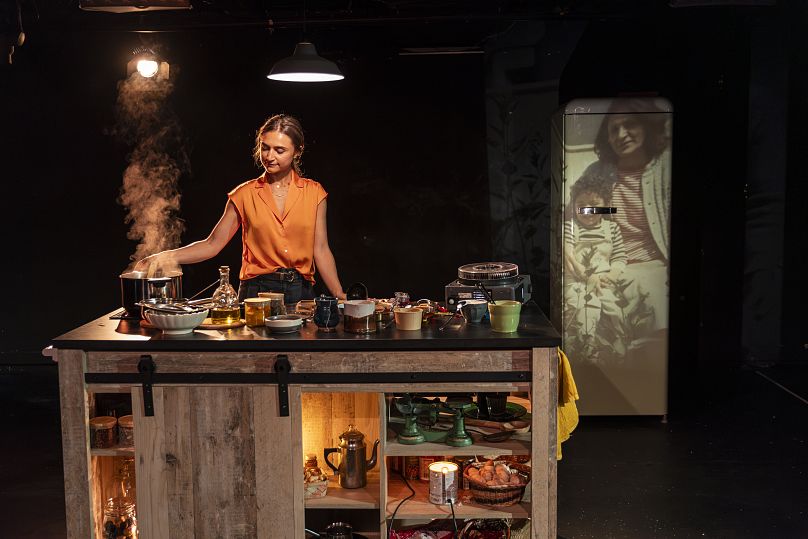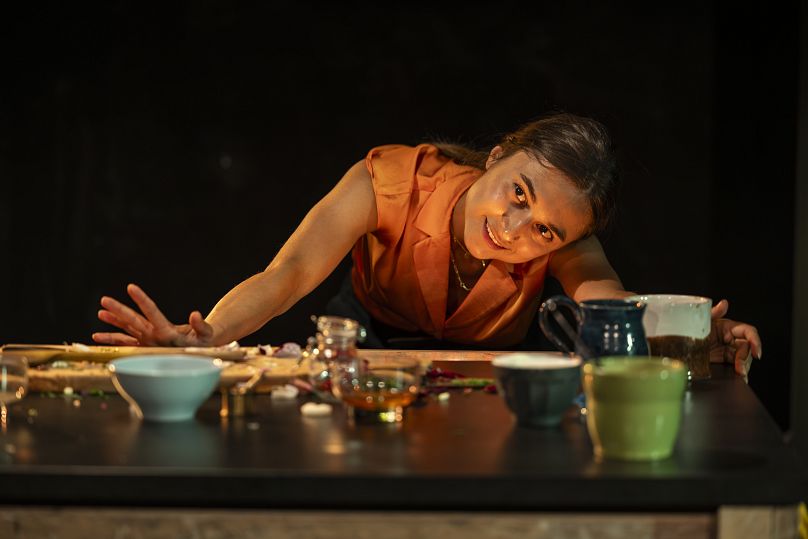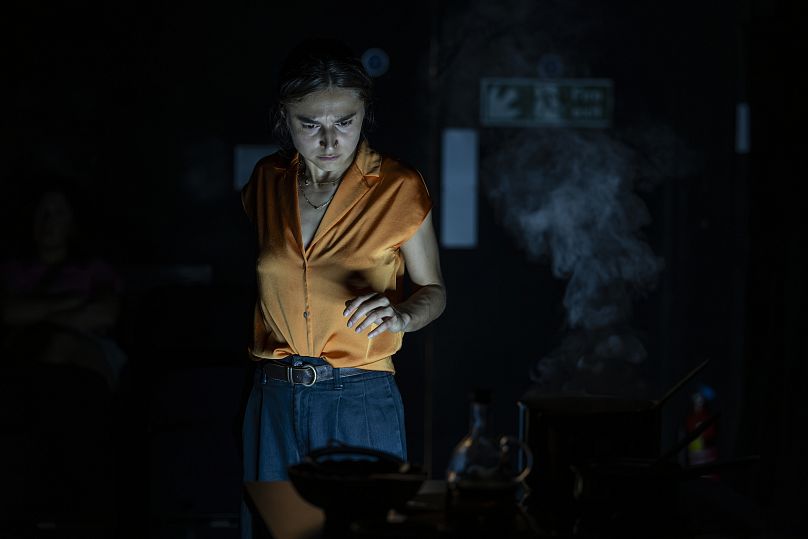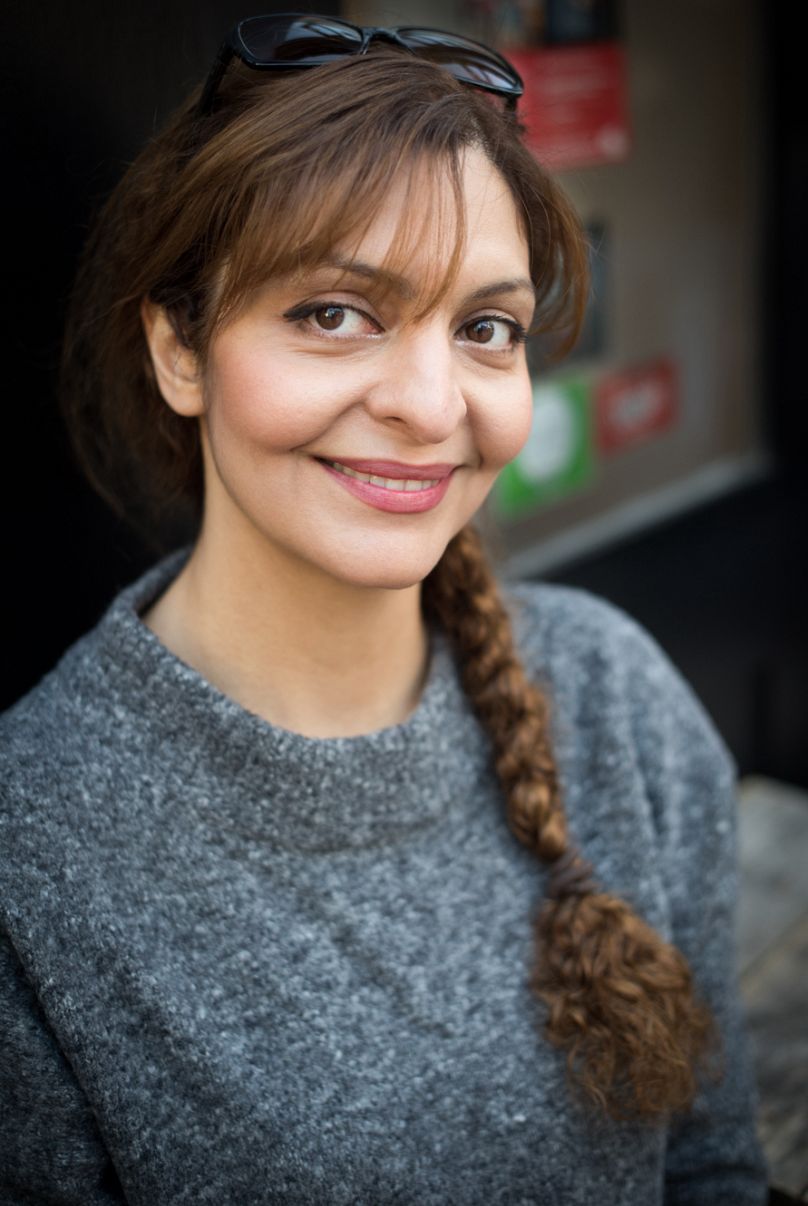Euronews Culture sat down with actor Isabella Nefar to discuss how she brought Atoosa Sepehr's story of escaping Iran to the stage, while also feeding an entire audience.
Food has always had a transcendent quality. Marcel Proust knew that when the scent of a madeleine sent him time-travelling back to his childhood. Likewise for the restaurant critic in Ratatouille. A new show takes that idea and transports the audience to the sights, sounds, smells, and tastes of Iran every night.
Many shows these days come with a content warning. This is a rare one with an allergy warning.
Written by Hannah Khalil, ‘My English Persian Kitchen’ tells the true story of Atoosa Sepehr, an Iranian woman who fled her Tehran home to escape domestic violence. Now in London, Sepehr’s past and present are brought together through the medium of cooking.
In Khalil’s play, this act of Persian nostalgia is told through an outstanding performance from solo actor Isabella Nefar who doesn’t just explain, but takes the audience to the streets of Tehran via a live cooking demo.
‘My English Persian Kitchen’ debuted at this year’s Edinburgh Fringe where its sold-out run played to great acclaim. We named it one of our top recommendations for the Fringe. Now, the show is about to transfer to London for a three-week run at the Soho Theatre.
Ahead of its London transfer, we sat down with actor Isabella Nefar to discuss bringing Persian culture to the stage and the kitchen.
Part of what makes ‘My English Persian Kitchen’ such an impressive piece of theatre is the way it seamlessly blends together Sepehr’s fraught personal story of leaving her family behind to escape her violent husband with a celebration of Persian culture.
Nefar’s narrator brings Iran to life for the audience as she depicts the joys of Sepehr’s familial and friendly interaction, the satisfaction of her business career in Tehran, and the oppression of her marriage and her struggle to free herself from Iran’s patriarchal bureaucratic tyranny.
Balanced more finely than her diced garlic, Nefar also brings a pot of ash-e-reshteh to life. The Persian noodle stew is filled with herbs, mint oil, and saffron, giving the audience a strong sense of the streets of Iran.
It’s incredible that neither the food cooking element of the show nor the narrative ever overshadow the other. Nor does the narrative ever lead to burning the onions and garlic simmering away in a pan throughout her monologues.
“I had to trust that I can leave the dish by itself,” Nefar says. When you watch the play, Nefar goes from one topic to another as she goes on a non-linear journey through memory and her present life. “The difficult part was to leave the kitchen and go somewhere else and come back and just be sure that that exact temperature was the right temperature for the garlic and the onions.”
This took a lot of experimentation with getting the heat of the pans exactly right for the sections Nefar is away from the stove. Ash-e-reshteh was chosen by Sepehr – who is now a practising nutritional therapist and is writing her second cookbook – because of its relative simplicity. The stew can be left bubbling away for long periods of time.
Ash-e-reshteh is also a perfect encapsulation of Persian cooking. It features all the staples of the region, from saffron to turmeric, but it also captures a detail of the migrant experience. In Tehran, ash-e-reshteh isn’t a dish you’d cook at home. It’s one you’d buy on the streets while socialising with friends. To recreate it at home is a purposeful act of bringing Persian culture to her English life by habits that she didn’t even have back home.
“I left Iran in a way knowing that I couldn't go back,” Nefar says, although noting it was maybe not in as dramatic circumstances as for Sepehr.
While Sepehr preferred computers to kitchens in Iran, Nefar has always loved cooking. “So when I came to the UK, I realised that those smells and those ingredients really reminded me of home.”
Nefar didn’t take long to find herself in Khalil’s script. “I know what it means not to be able to go back, not to be able to go back to visit family.” But the often verbatim piece was more than just about escape to her. “This play was more about talking about how resilient someone can be in a new country, and how food reconnects you with your home.”
Domestic violence is at the forefront of the play, but Nefar and the creative team behind it were conscious that this – and the escape narrative – play into a set of stereotypes around Iran. “The conversations we were having were mostly about giving a sense of awareness,” Nefar says. “We live very freely in some countries and forget about all the rights we have and the power of a passport.”
Throughout the show, Nefar always paints Iran with a frank but generous brush. Yes, women’s passports are often controlled by their husbands. But they’re also frequently the breadwinners, going to university and learning skilled trades.
Nefar carries the same enthusiasm for life – and Persia – that her character has in the show. It’s an enthusiasm that the show has marinated in and has connected with its audience. At the end of the show, when Nefar hands around bowls of the ash-e-reshteh, people take the opportunity to share the ways they’ve connected with the story.
“I think that’s probably my favourite thing is the part where I'm there at the end of the play, so people can come and immediately share their first thoughts,” Nefar says. She’s been hugged, others have cried, some laugh, and the rest ask for ingredients.
“People that had connections with Iran, like in the 70s, tell me how I've opened up a whole box of memories of how Iran was and how they were taken in people's houses and offered food, and they've given all this hospitality.” Others from the diaspora who have never visited tell stories of their parents’ cooking.
You don’t need a connection to Iran to connect with this play though. Sepehr has said that, to her, the play is about how “even in our lowest moments life sometimes offers a way out,” and that when someone migrates, bringing part of their culture with them is an empowering and uplifting act. “Culture truly has no borders”, she said.
Nefar agrees. As the play prepares for its London transfer, she’s looking forward to making that cultural connection with new audiences through weeks of telling Sepehr’s story and cooking ash-e-reshteh, the dish that encapsulates so much of the Persian diaspora experience. “It is a dish that they get for free in the street sometimes. So for us to then share it to the audience for free, without them having to give anything back, it’s just the perfect, perfect dish,” she says.
'My English Persian Kitchen' is at the Soho Theatre, London from 16 September to 5 October.















